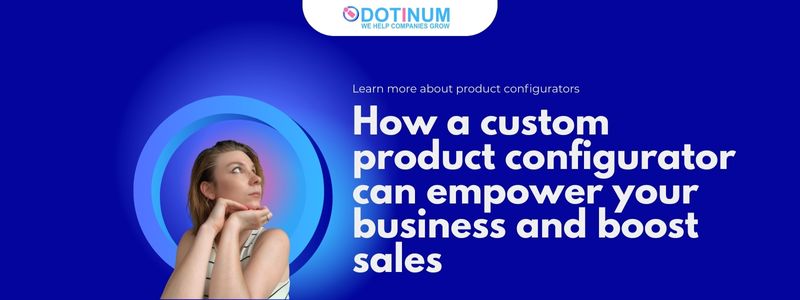TL;DR This article explains how product configurators improve e-commerce by enhancing personalization, boosting conversions, reducing returns, and providing valuable customer insights. You’ll also see examples of different use cases and a case study of PlasticExpress, the first online store in Poland with a fully customized product configurator.
How product configurators drive personalization
Modern shoppers crave personalized experiences. Product configurators allow customers to customize products to their preferences, whether it’s choosing colors, materials, or specific features. This level of personalization strengthens the emotional connection with the brand, turning casual shoppers into loyal customers.
When customers design their own products, they feel more invested, leading to higher engagement and repeat purchases.
Why configurators improve conversion rates
Giving customers control over product customization reduces purchase hesitation. With real-time previews, customers can see exactly what they are getting, making them more confident in their purchase decisions.
Studies show that customers who use configurators are more likely to complete their purchases, as the customization process makes them feel more attached to the product.
Higher conversion rates mean more sales, directly impacting your bottom line.
How configurators minimize returns
One of the biggest challenges in e-commerce is high return rates due to mismatched customer expectations. Product configurators solve this by offering accurate visual previews, ensuring that customers know exactly what to expect.
Reducing returns not only saves on costs but also improves customer satisfaction, leading to long-term loyalty.

Creating seamless shopping journeys with configurators
Today’s consumers expect smooth and intuitive online experiences. Product configurators make shopping fun and interactive, allowing customers to craft their ideal product without compromises.
A positive shopping experience keeps customers coming back, increasing customer retention and lifetime value.
Using configurator data to refine marketing strategies
Implementing a product configurator provides valuable insights into customer preferences. By analyzing which options are most popular, businesses can fine-tune their marketing efforts and inventory management.
Data-driven marketing is more effective, helping brands tailor their strategies to customer needs and optimize product offerings.
Expanding the use of configurators beyond retail
Product configurators aren’t just for fashion or furniture—they can be adapted to industries like automotive, electronics, and even custom manufacturing. As technology evolves, configurators can integrate seamlessly with CRM and ERP systems, enhancing efficiency.
Scalable configurators allow businesses to expand into new markets, offering customized products while maintaining streamlined operations.
How we created the product configurator for Plastic Express
PlasticExpress is the first online store in Poland that sells plastic plates with a product configurator, adjusted to the shape and dimensions the customer requires.
The project was made for Contra Sp. Zoo. Sp. K., which specializes in the production of advertising articles made of plastics, especially PoS and display products and plexiglass processing. Since 2005, the company has been operating in 14 European countries. Contra cooperates with well-known brands such as Apart, Nivea and Santander.
From the perspective of our client, an important issue was the automation of production, plus logistic and accounting processes, by providing daily order reports. These took the form of textual information containing the details of the order and the added SVG file with the shape configured by the customer. To provide the user with the best experience related to website service, we also conducted a number of usability tests. In addition to building an advanced product configurator, we have created and implemented many additional processes enabling online shopping and its efficient running, including:
- cart and cash desk service – order processing,
- creating user accounts – clients,
- payment and shipping service (including calculation of shipping costs based on dimensions and weight of configured products),
- sending notifications,
- implementation of a “money-box” feature, into which customers receive a percentage of their order value after purchasing. This can then be redeemed against future orders,
- implementation of discounts – fixed for intermediaries and additional ones depending on the size of the order,
- handling of queries for non-standard products that cannot be edited in the configurator.
Thanks to the implemented solutions, we have created the first online store in Poland that allows users to create fully personalized plastic products.
The team was deeply engaged in my project. They always looked ahead and knew how to implement each of my ideas, no matter how difficult they seemed. They were able to anticipate potential problems and the outcomes of all actions. Thanks to building a professional product configurator for our online store, our sales increased significantly, our new customer base grew considerably, and we reached new markets that had previously been unavailable to us.
Marcin Rynkowski
Owner of the PlasticExpress platform
PlasticExpress is a response to the growing demand for plexiglass products adapted to the unique shape desired by the recipient. The client can easily evaluate and order a number of basic shapes, letters and numbers with the possibility of cutting holes in them.
Conclusion
Product configurators are essential tools for modern e-commerce businesses looking to stay competitive. They enhance customer engagement, boost conversion rates, and reduce returns while providing actionable data for better decision-making. By adopting product configurators, brands can create a unique shopping experience that keeps customers coming back, leading to sustainable growth and long-term success.
Frequently Asked Questions (FAQ)
What is a product configurator in e-commerce?
It’s an online tool that lets customers personalize products by selecting colors, materials, sizes, or other features before purchase.
Do product configurators increase sales?
Yes. By boosting confidence and engagement, configurators directly improve conversion rates and average order values.
Can configurators reduce product returns?
Absolutely. Real-time previews ensure customers know exactly what they are ordering, reducing mismatches and returns.
Which industries can benefit from product configurators?
Beyond retail, configurators are used in automotive, electronics, manufacturing, and B2B sectors.